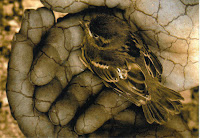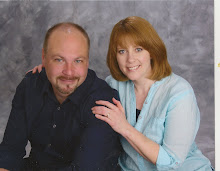
When did that darkness completely dissipate? I'm not sure, but as I read the account this time it came alive with vibrant meaning for me, here, now. It was like that perfect moment early in the morning when the deep purples, blues, and pinks of dawn are in perfect balance with the first burst of sunlight over the mountain. The colors are so beautiful and serve to emphasize the wonder- often taken for granted once the sun's light has completely dissipated the darkness- of a new day, of life, of eternal hope. "Which hope, cometh of faith, maketh an anchor to the souls of men." (Ether 12:4) The hope and anchor Paul knew when he wrote:
For I am persuaded, that neither death, nor life, nor angels, nor principalities, nor powers, nor thing present, nor things to come, nor height, nor depth, nor any other creature, shall be able to separate us from the love of God, which is in Christ Jesus our Lord. (Romas 8:38-39)
As Paul carefully explains earlier in the chapter, the only thing that can separate us from the strengthening, healing, redeeming love of God is our rejection of it. That is so important to understand when approaching this epoch story.
Elder David A. Bednar noted the use of the word unto: “Please notice how the power of the Spirit carries the message unto but not necessarily into the heart. … Ultimately, … the content of a message and the witness of the Holy Ghost penetrate into the heart only if a receiver allows them to enter.” (2 Nephi 33:1)Now let's think about what happened during the time when Enoch and his people were building Zion. According to our record, Enoch humbly recognized those he spoke to as his brethren, equally loved of God and equally capable of deciding for themselves. Under the Lord's direction, he pleaded with them to consider the world on which they stood, and the magnitude of creation, and to stop denying their creator. Some listened and began to "experiment upon (the) words" that Enoch taught and to repent (turn back) to the Lord. (Alma 32:27, Enoch 7) Those who listened to Enoch, were so unpopular they had to flee for their lives. It took moving mountains, literally, to get those who wanted them dead to stand off. Zion was protected until the people had become beings who could comfortably dwell and learn in the presence of God. (A testimony that no one has power to thwart the purposes and opportunities that are important for our eternal growth, if we rely on the Lord.)
Why just unto the heart? Individual agency is so sacred that Heavenly Father will never force the human heart, even with all His infinite power. Man may try to do so, but God does not. To put it another way, God allows us to be the guardians, or the gatekeepers, of our own hearts. We must, of our own free will, open our hearts to the Spirit, for He will not force Himself upon us. (Gerald N. Lund, “Opening Our Hearts,” Ensign, May 2008, 32–34)
When the enemies of Zion noticed it was gone, they gloated that "Zion had fled."(Moses 7:69) In other words, "We won, they fled, we have successfully cast them out from among us!" Nor was the world any more accepting of those who remained behind to carry on the Lord's work. Noah not only dealt with mockery as he taught and warned, but attempts on his life. (Moses 8:18)
This correlates to a repeated pattern taught in all the scriptures, but expressly spelled out in the Book of Mormon:
Yea, and I say unto you that if it were not for the prayers of the righteous, who are now in the land that ye would even now would be visited by utter destruction; yet it would not be by flood, as were the people in the days of Noah, but it would be by famine, and by pestilence and by the sword.That imagery,of the Lord's hand, is also central in what the Lord relates to Enoch about the flood:
But it is by the prayers of the righteous that ye are spared; now therefore, If ye will cast out the righteous from among you then will not the lord stay his hand; (Alma 10:23-24)
The Lord said unto Enoch: Behold, I am God; man of Holiness is my name, man of counsel is my name; and Endless sand Eternal is my name also. Wherefore, I can stretch forth mine hands and hold all the creations which I have made; and mine eye can pierce them also, and among all the workmanship of mine hands there has not been so great wickedness (rejection of the Lord's directions and power) as among they brethren. (Moses 7:35-36)Just as the Lord won't force us to open our hearts-he won't force us, once we have intentionally and decidedly rejected his power, to live with the organizing, creating, sustaining, enabling grace which holds all creation together. For visualization purposes it is as if we are held lovingly in the cupped palm of his hand, and when we insist, the palm straightens out, pulls away, and we are "free" to fall.
Seeing and living through the effects of the Lord withdrawing -and the earth momentarily re-experiencing a piece of its primordial chaos- was so horrific that the righteous (namely Enoch and Noah) prayed that the Lord would never again withdraw so completely. The Lord did promise, and as pointed out in the scripture above, is able to enforce eternal laws and justice equally well through other means. But, there are eternally significant reasons why the flood did happen, not the least of which is its testimony of both the Lord's power and our own position and need of him. A heartbreaking global example of the truth which is so aptly illustrated by this passage:
All flesh is grass, and all the goodliness thereof is as the flower of the field…Behold the nations are as a drop of the bucket, and are counted as the small dust of the balance; behold, (God) taketh up the isles as a very little thing….It is He that sitteth upon the circle of the earth, and the inhabitants thereof are as grasshoppers; (He) bringeth the princes to nothing; he maketh the judges of the earth as vanity. (Isaiah 40:8-23)Remember that all the Lord says and does, he does for our benefit (John 3:16, 2 Nephi 26:23) So, the account of the flood also carries a message of profound, infinite hope. Hope that even if the whole world falls apart, if we choose the Lord, He will be with us even as he was with Noah:
Wherefore Enoch saw that Noah built and ark; and that the Lord smiled upon it, and held it in his own hand....(Moses 7:43)Also, remember:
Are not two sparrows sold for a farthing, and one of them shall not fall on the ground without your Father, but the very hairs of your head are all numbered. Fear ye not therefore, ye are of more value than many sparrows. (Matthew 10:29-30)The Savior spoke those last words to his apostles before sending them out to teach. He knew they would face opposition. He prepared them for it, even telling them they would be scourged for their testimony of Him. His admonition was given to strengthen them and help them keep their perspective in the midst of difficulty. To help them look for and see how the hand of the Lord was upholding them, strengthening and enabling them to become. Now let's consider for a moment how the same was true for Noah, another faithful follower of Christ.
 According to the record the flood was a storm unlike any we see today. The rain was continuous for 40 days and winds never ceased. We know the kinds of conditions that a severe storm can cause in a matter of minutes. A Tornado can wipe out a town. When that kind of storm combines over water, we call it a hurricane, and it can create a force more powerful and destructive than several atomic bombs. We know that vessels of twice the recorded size and stature of the ark have been broken to bits by lesser storms. If you've seen the recent articles on rogue waves or movies such as The Perfect Storm, you get some idea of the miracle it was that the ark survived the storm. And you get a glimpse into the level of individual care and infinite control the Lord exercises for each one of his children, if they will allow. And you also get a glimpse into the character of Noah.
According to the record the flood was a storm unlike any we see today. The rain was continuous for 40 days and winds never ceased. We know the kinds of conditions that a severe storm can cause in a matter of minutes. A Tornado can wipe out a town. When that kind of storm combines over water, we call it a hurricane, and it can create a force more powerful and destructive than several atomic bombs. We know that vessels of twice the recorded size and stature of the ark have been broken to bits by lesser storms. If you've seen the recent articles on rogue waves or movies such as The Perfect Storm, you get some idea of the miracle it was that the ark survived the storm. And you get a glimpse into the level of individual care and infinite control the Lord exercises for each one of his children, if they will allow. And you also get a glimpse into the character of Noah.Again, our experience tells us that passing through a decidedly lesser storm is an uncomfortable experience at best. The ark was not a luxury vessel- it had no heat or other accommodations. Jewish tradition recounts that Noah and his family suffered from cold, and with illness severe enough that he coughed up blood. (Hugh Nibley, Abraham in Egypt, Deseret Book, 1981, p.264) After living through these difficulties, what is his first act upon leaving the ark? It was to "build and altar to the Lord" and offer sacrifice in gratitude. Yes, he was supported by the hand of the Lord through this experience, but, no, he was not denied the oppositional opportunities for growth that come with challenges. Most importantly, he was able to profit because he recognized, with gratitude the hand that supported his every breath through the whole eternally profitable learning experience. In turn, this account can help us maintain perspective as we try to understand the difficult storms that come into our lives. Help us to not focus on the dark, cold, and discomfort, but instead discern the hand that is, even in the midst of the storm, upholding us- ensuring that even as we are tossed, we are moving forward toward our eternal goals-being prepared to see the Lord's promises fulfilled in our own lives:
The grass withereth, the flower fadeth; but the word of our God shall stand for ever…Behold, the Lord God will come with strong hand….
Hath thou not know? Hast thou not heard, that the everlasting God, the Lord, the Creator of the ends of the earth, fainteth not, neither is weary?
He giveth power to the faint; and to them that have no might he increaseth strength. Even the youths shall faint and be weary, and the young men shall utterly fall;But they that wait (move forward with hope) upon the Lord shall renew their strength; they shall mount up with wings as eagles….(Isaiah 40 10,28-31)



No comments:
Post a Comment